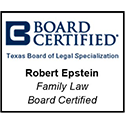
Guiding our clients with honesty and compassion through a difficult time is what drives everyone at Epstein Family Law.
Dallas Divorce Attorney
Relentless Divorce Lawyers Serving Dallas County, TX
Clients throughout Dallas and the surrounding counties trust the experienced divorce lawyers at Epstein Family Law to guide them through the divorce process and help them move forward after a challenging chapter in their lives. Many of our clients seek to achieve the right outcome quickly, so responsiveness and drive are core values in our approach. These qualities help us pursue the outcomes our clients need. Clients come to our Dallas divorce attorneys from diverse backgrounds across North Texas, from the highest-net-worth business owners and public figures with complex property issues and privacy concerns to parents with modest marital estates and young children caught in difficult conflicts.
Our team maintains a thorough knowledge of Dallas County court procedures and filing requirements, ensuring each step of the process fits the needs of local clients. We stay up to date with Texas family law changes and know how these updates impact clients locally. Because we represent clients in district courts across Dallas, we understand the nuances that can shape outcomes, from judge preferences to local rules for property disclosures or parenting plans.
To learn more about our services, call (972) 232-7673 or contact us online to speak to our knowledgeable Dallas divorce attorneys.
Cost & Timeline: What to Expect During a Divorce in Dallas
Pursuing a divorce in Dallas requires careful planning and practical awareness of the costs and timelines involved. In Texas, filing fees and county service costs can fluctuate, but most clients should expect an initial filing fee when petitioning for divorce—typically ranging from $300 to $400 in Dallas County. Other expenses may include serving your spouse, attending court hearings, or requesting additional orders, such as temporary arrangements for child custody or financial support. Legal fees will vary based on the complexity of your case, the degree of disagreement, and the need for property appraisals or outside experts. High-net-worth divorces or cases with contested child custody often require additional diligence and resources.
Most divorces in Dallas take longer than the state minimum of 60 days, especially if major issues need to be resolved through negotiation or trial. Uncontested divorces—where both parties agree on all terms—generally reach resolution on the shorter end of the timeframe, while contested divorces can last several months depending on court schedules and discovery periods. Dallas courts require parties to participate in mediation in many cases to encourage settlement. Families need to plan for potential delays due to the volume of cases in Dallas County Family Courts, especially during peak periods. Our legal team keeps clients informed at every step so they understand the timing, fees, and milestones specific to the Dallas area.
We believe transparency in fee structures helps clients make informed decisions that work for their lives and financial situations. In each consultation, we outline potential costs and provide realistic expectations based on the unique facts of the case. Being prepared for these aspects creates clarity and reduces stress throughout the process.
Our Broad Capabilities In Texas Divorce Cases
We have deep experience handling the wide range of issues that can affect the outcome of a divorce in Texas, including but not limited to:
- Complex Property Division
- Business and Stock Ownership Valuations
- Asset Tracing
- Child Custody and Visitation
- Child Support
- Parental Rights and Duties
- Spousal Support
- Marital Agreement Disputes
- Military Spouses
- Substance Abuse and Recovery Issues
- Domestic Violence
- Protective Orders
- Adultery
- Enforcement Actions
- Collaborative Divorce
- Mediation
Our Dallas divorce attorneys handle matters involving contested asset division, multi-jurisdictional property, and complex business arrangements. We have guided clients through divorces that require tracing complex finances, dealing with family-owned businesses, and addressing inherited or commingled assets. Our careful approach benefits clients by clarifying property rights and obligations and preparing them for negotiations or court proceedings. When parental rights are at stake, we provide stable counsel and sound legal strategies focused on the well-being of children.
How to Find the Right Divorce Attorney in Dallas
Choosing the right attorney shapes how your divorce unfolds—especially in a large metropolitan area like Dallas, where courts and attorneys have different experience levels and approaches. Look for a divorce attorney who aligns with your values and communicates clearly about timelines, costs, and strategies. Ask about experience with cases like yours, whether complex business valuations or sensitive custody arrangements. Since Dallas County Family Court has precise rules and procedures, hiring someone familiar with local judges and norms can improve efficiency and avoid missteps.
We recommend that clients interview more than one attorney and come prepared with questions about communication style, responsiveness, and track record in Dallas courts. A trustworthy lawyer will outline possible outcomes but avoid making promises about the final result. At Epstein Family Law PC, we emphasize honesty, compassion, and respect in all client communication. Our team keeps clients informed with regular updates, practical legal guidance, and a focus on strategies tailored to each client’s goals. This approach builds trust and helps clients make confident decisions during a difficult process.
Dallas residents benefit from working with a firm that knows local courtrooms and is ready to guide clients through both negotiation and litigation as needed. Consultations offer a chance to discuss your unique concerns and learn how our team’s collaborative and driven approach stands out in the Dallas legal community.
Legal Standards & Community Property Laws in Texas
Texas courts follow community property rules when dividing assets in divorce, meaning most property acquired during marriage belongs to both spouses and will be divided equitably. However, not all property is community property—items owned before marriage or received as separate gifts or inheritances typically remain with the original owner. In Dallas County, family court judges look at a range of factors to decide what’s fair, including the length of the marriage, contributions of each spouse, and the needs of any children.
Understanding how Texas community property law applies to your situation is vital, especially when separate and community assets have been combined or used together. Divorce attorneys often help clients identify and document these distinctions with care, so the court receives an accurate picture. Dallas courts may also consider unique local factors, such as property values in city neighborhoods or the complexities of dividing business assets located in the Dallas area. Knowing these standards and their local application provides an advantage for those navigating marital property division. Our team works diligently to present well-supported evidence so clients’ rights remain preserved under Texas law.
Filing For Divorce In Texas
Filing for divorce in Texas typically involves these steps:
- Residency Requirement: At least one spouse must have lived in Texas for at least six months and in the county where they plan to file for at least 90 days.
- Choose Your Grounds: Texas allows both "no-fault" and "fault-based" divorce. No-fault grounds mean the marriage has become insupportable, while fault-based grounds can include cruelty, adultery, abandonment, or incarceration.
- Prepare Divorce Petition: You (the petitioner) or your attorney will draft a divorce petition that includes information about the marriage, grounds for divorce, and requests related to property division, child custody, and support.
- File the Petition: File the divorce petition with the appropriate district court in the county where you or your spouse resides.
- Notify Your Spouse: Serve your spouse with a copy of the divorce petition and a citation, which gives formal notice that a divorce has been filed. The spouse typically has 20 days to respond.
- Temporary Orders: Request temporary orders for matters such as child custody, visitation, support, and property use as needed during the divorce process.
- Waiting Period: Texas requires a 60-day waiting period after filing before the divorce can be finalized. In contested cases, the process may take longer.
- Negotiation or Trial: You and your spouse will negotiate the terms of the divorce. If you cannot reach an agreement, the case may go to trial, where a judge will decide.
- Final Decree of Divorce: Once all terms are settled, a Final Decree of Divorce is prepared and signed by the judge, officially ending the marriage.
- Division of Property: The court will divide marital property equitably, which does not always mean a 50/50 split.
- Child Custody and Support: If children are involved, the court will determine custody, visitation, and child support based on the child’s best interests.
- Spousal Support: If appropriate, the court may order spousal support (alimony) considering the marriage length, financial need, and ability to pay.
- Name Change: If you wish to change your name, you can request it as part of the divorce decree.
- Finalize the Divorce: The divorce is finalized when the judge signs the Final Decree of Divorce. You will receive a copy of this decree.
Before filing for divorce, gather all necessary financial documentation including bank statements, tax returns, mortgage documents, and investment portfolios. Comprehensive preparation can position you better during negotiations and court proceedings. Understanding Texas community property laws and preparing for financial disclosures can also help you navigate the division of assets effectively.
Texas counties, including Dallas County, require divorce filings at the district courthouse, and clients must follow the timelines set by the courts. Each county may have unique scheduling protocols and preferred documentation formats for filings or hearings, which can affect the flow of your case. Understanding these local requirements ensures smoother progress from filing to final order. For cases involving children or substantial estates, Dallas County courts may schedule temporary hearings promptly to resolve urgent matters.
Consulting with a divorce attorney who understands Texas family law can be crucial to achieving a constructive outcome, especially if your case involves complex issues or disputes.
Understanding the Divorce Process In Texas
Going through a divorce can be a challenging and emotional experience. Having a clear understanding of the divorce process in Texas can help reduce stress. At Epstein Family Law PC, our experienced Dallas divorce lawyers guide you through each step to protect your rights and best interests.
Here is an overview of the divorce process in Texas:
- Filing for Divorce: The first step involves filing a Petition for Divorce with the appropriate court. Our attorneys help you prepare and file all necessary documents.
- Temporary Orders: In some cases, you may need temporary orders for child custody, visitation, spousal support, and related matters during the divorce.
- Discovery: Both parties exchange documents and information relevant to the divorce, such as financial records, property ownership, and child custody evaluations.
- Negotiation and Mediation: Our divorce lawyers negotiate on your behalf or guide you through mediation to reach fair settlements, which often saves time, money, and stress.
- Divorce Trial: If you cannot settle, your case can go to trial. Our attorneys advocate for you in court to protect your interests.
- Finalizing the Divorce: Once all issues resolve, the court issues a final divorce decree outlining the terms, including child custody, support, and division of assets and debts.
Knowing what to expect during each stage of a divorce can reduce uncertainty and allow you to make informed decisions. Many divorce cases in Dallas proceed through mediation or settlement conferences arranged by local courts to resolve key issues without a lengthy trial. The Dallas County legal system encourages parties to settle disputes when possible, which can help families move forward with less conflict. During discovery, both sides work to exchange clear, accurate information about finances, property, and child-related concerns.
Maintaining open communication with your lawyer ensures timely updates and strategic adjustments throughout the divorce process. Assessing your personal and emotional readiness for life after divorce can help guide important decisions about finances and living arrangements.
At Epstein Family Law PC, every divorce is unique. We tailor our approach to your specific needs. Contact our Dallas divorce lawyers today to schedule a consultation and learn more about how we can help you navigate the divorce process in Texas.
To learn more about our services, call (972) 232-7673 or contact us online to speak to our knowledgeable Dallas divorce attorneys.
Dallas Divorce Lawyers Handling High-Value Marital Estates
Our Dallas divorce attorneys have the experience and resources to resolve large cases involving the most complex property characterization, valuation, and division issues. Entrepreneurs, professional athletes, C-suite executives, and their spouses trust us in matters that include multi-million-dollar estates, hidden assets, diverse business interests, and disputes related to prenuptial and post-marital agreements.
Many high-value divorce cases involve unique financial portfolios, intricate compensation structures, and ownership of multiple real estate properties within Texas and outside of it. Our firm remains current on the ever-evolving landscape of federal and state tax regulations that can affect asset division. We coordinate with financial professionals and appraisers based in the Dallas area to generate accurate reports and valuations, and we adopt a proactive approach to uncover any asset transfers or withdrawals that might impact fair distribution. The Dallas County courts often require full transparency and precise documentation, so we ensure a thorough presentation of our clients’ financial position.
Handling high-value marital estates requires a solid understanding of asset management, tax considerations, and long-term financial planning. Our team diligently examines all assets—offshore accounts, investment portfolios, and business holdings—to ensure every item receives proper evaluation and equitable division in court. We emphasize transparency and accuracy in financial disclosures, working to protect your financial interests during and after divorce proceedings. When necessary, we engage financial experts and appraisers for well-supported, credible testimony that strengthens your position.
Protecting The Best Interests Of Your Children
Caring forms the foundation of our work. We draw on all our strengths to help clients achieve their goals, especially where children are involved. Divorce often requires difficult decisions that impact long-term child welfare, including custody, visitation rights, financial support, and decision-making responsibilities.
We work to foster effective communication and cooperation between parents whenever possible, recognizing that ongoing parental conflict can have lasting effects on children’s well-being. Our team stays informed about Dallas County family court trends and best practices, so we can tailor parenting agreements and custody schedules that align with your child’s needs and routine. When the situation calls for court intervention, we prepare detailed documentation and thorough legal arguments to support your position and the child’s best interests. Whether through negotiation or litigation, we aim for results that give your family stability and a sense of continuity.
For every case, we focus on negotiating custody, child support, and parenting arrangements tailored to the family’s values and circumstances. We strive to promote healthy co-parenting relationships and minimize future conflicts. When necessary, we are prepared to litigate to achieve our client’s objectives and protect the children’s best interests.
Our approach to child custody and support prioritizes stability and consistency for the child. We advocate for routines and encourage positive involvement by both parents in the child’s life. We recognize the emotional and psychological impact divorce has on children and work to create supportive, constructive arrangements. Every agreement we seek serves both legal and emotional needs, fostering an environment where children can thrive.
Collaborative Divorce In Texas
Our family law firm has guided many clients through the collaborative divorce process to avoid the cost, stress, and uncertainty of courtroom litigation. Collaborative divorce is a private settlement process where trained lawyers help spouses negotiate binding agreements outside the courtroom. The collaborative process motivates both spouses to settle, as not reaching an agreement requires them to hire new attorneys and start formal litigation.
Clients in Dallas benefit from collaborative divorce by preserving privacy and minimizing the disruption to their daily lives. Each spouse participates in structured meetings intended to resolve disputes with mutual respect. This approach often involves other professionals, such as financial neutrals or family counselors, who help design creative solutions tailored to complex family and financial circumstances. Because the process occurs outside public court records, collaborative divorce appeals to those concerned about confidentiality or reputational risk—features valued by many residents in the Dallas area, including business owners and professionals.
Collaborative divorce often benefits public figures, high-net-worth individuals who value privacy, parents wanting to shield their children from court proceedings, and spouses seeking flexible, creative solutions to complex divorces. Collaborative divorce requires both spouses and their lawyers to approach negotiations in good faith, set aside past conflicts, and focus on a positive resolution.
A primary advantage of collaborative divorce is the control it offers both parties in shaping their final agreement. Unlike the unpredictability of litigation, collaborative divorce encourages transparency and direct communication. This path works well for those committed to maintaining respectful post-divorce relationships and developing solutions for shared responsibilities such as co-parenting, support payments, and property transfers. This method encourages amicable resolutions and supports constructive interaction in the future.
Dallas Divorce FAQ
What are the grounds for divorce in Dallas?
In Dallas, a divorce can be filed on no-fault or fault grounds. No-fault grounds include insupportability, meaning the marriage cannot continue due to conflict or discord. Fault grounds may include adultery, cruelty, abandonment, felony conviction, or living apart for at least three years.
How long does the divorce process take?
Texas law includes a 60-day waiting period from the date of filing the petition. The process may take longer if the case is contested or involves complex issues.
What is the difference between contested and uncontested divorce?
An uncontested divorce occurs when both spouses agree on all major issues, such as property division, child custody, and support, allowing for a quicker resolution. Contested divorces arise when spouses cannot agree on issues, requiring court intervention to reach a settlement.
How is property divided?
Texas follows community property laws, so property acquired during marriage is considered jointly owned and will be divided equitably by the court. This division is not always a 50/50 split; the court considers factors to ensure fairness.
What about child custody and support?
Courts in Dallas decide child custody based on the child’s best interests. Texas law favors joint custody when possible. Child support is calculated under state guidelines, considering both parents’ income and the child’s needs.
How can a divorce attorney help me?
A divorce attorney in Dallas provides guidance and representation throughout the divorce process. They negotiate settlements, protect your rights, and help you navigate legal complexities to pursue the best outcome.
Consult With a Divorce Lawyer in Dallas
To learn more about our services, call (972) 232-7673 or contact us online to speak to our knowledgeable Dallas divorce attorneys.
-
Drive
It is a critical component of getting to the best outcome.
-
Respect
This means not only our clients but all other parties and professionals.
-
Honesty
We are in the business of truth. Earning your trust is our top priority.
-
Integrity
There is no perfect way to do things, but there are right ways. We are conscious driven.
-
Compassion
Caring is at our core.
We have the experience of handling a wide range of family law issues, with the knowledge and skill to create a tailored approach to each case. Clients can count on our hustle, drive and determination – they are our commitment to your family, and your financial and future goals.
Client Testimonials
-
Robert, is professional
C.D. -
"If you are looking for a professional family law firm, the Epstein firm is top notch."B.M.
-
I highly recommend Robert Epstein of Epstein family law
J.G.



















